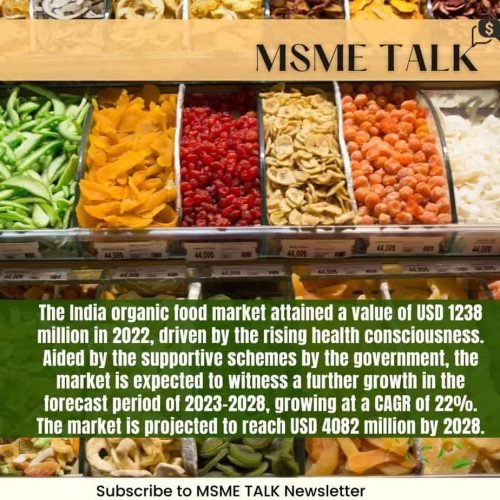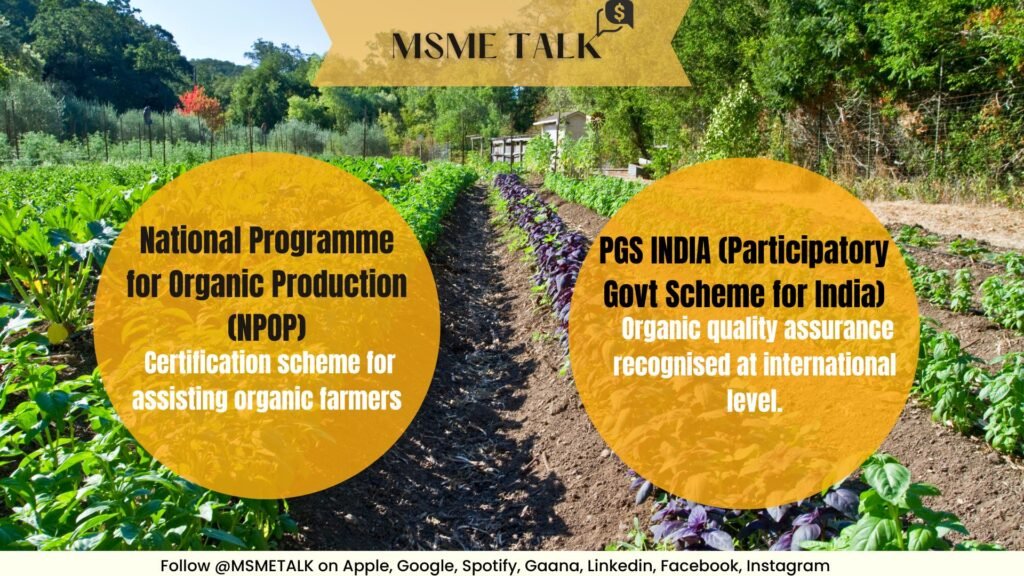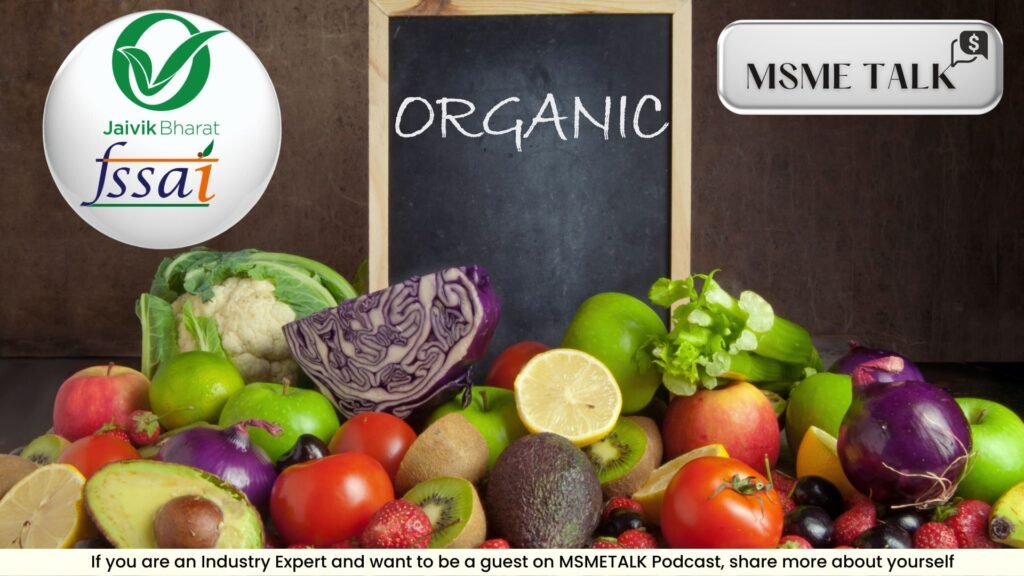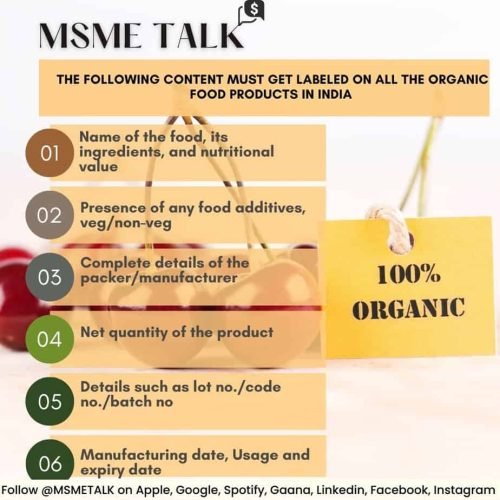Contents
ToggleMSMEs, tap into the Growing Market of Organic Products!
In today’s world , where health and sustainability are paramount, the market for organic products has emerged as a strategic and lucrative target. As more individuals seek healthier choices and environmentally responsible alternatives, businesses that cater to the organic market can thrive and make a positive impact. In this blog post, we’ll delve into why the organic product market is a compelling target market and how MSME businesses in India can effectively tap into this burgeoning trend.
What are organic products?
The products that are grown under a system of agriculture without the use of chemical fertilizers and pesticides with an environmentally and socially responsible approach
The growing organic products market encompasses a wide range of products, from food and beverages to skincare, clothing, and even household goods. What unites these products is a commitment to organic farming practices, which eschew synthetic chemicals and prioritize the well-being of consumers and the environment. This market has witnessed substantial growth, reflecting changing consumer preferences and values. MSEs should seize the opportunity in the expanding realm of organic products!
Organic product market in India- According to FiBL survey 2021, India holds a unique position among 187 countries practising organic agriculture. A major relative increase of organic agricultural land was noted in recent past throughout the country.
(Follow MSME TALK podcast, where we bring experts from the Industry to give value addition guidance, to scaleup and build long lasting business)
Scope of Organic products in India
The scope of organic products in India has been steadily increasing due to several factors like:
Growing Health and Wellness Awareness:Consumers in India are becoming more health-conscious and are seeking healthier alternatives to conventional products. Organic products are perceived as being free from harmful chemicals and pesticides, which aligns with this growing health and wellness trend

Rising Disposable Income: As India’s middle class continues to expand and disposable incomes increase, consumers are willing to spend more on premium and healthier products, including organic options.
Export Opportunities: India has a strong potential for exporting organic products to other countries, especially in regions where organic products are in high demand. This can provide an additional avenue for growth for domestic organic producers.
Between 2019-20 and 2021-22, a total of 1,978,460.38 million tonnes (mt) of organic products valued at $2,480.24 million were exported. About 50 per cent of these exports went to the US while 37 per cent went to the European Union (EU).
E-Commerce and Retail Expansion: The growth of e-commerce and modern retail formats has made it easier for consumers to access organic products. This distribution channel can significantly expand the reach of organic products to consumers across different regions.
Variety of Products: MSMEs should recognise that the scope of organic products is not limited to just food items. It extends to personal care, clothing, home products, and more. This diversity allows businesses to tap into various niches within the organic market.
Cultural and Traditional Emphasis: In India, there is a cultural emphasis on natural and traditional practices. Organic products align with these values, making them more appealing to a wide range of consumers.
Challenges with Conventional Agriculture: Concerns about soil degradation, water pollution, and health issues related to the use of chemical inputs in conventional agriculture have led to increased interest in organic farming methods.
Educational Efforts: As consumers become more educated about the benefits of organic products, they are more likely to make informed purchasing decisions, further driving the growth of the Indian market.
(If you are an entrepreneur and want to be a part of the MSME TALK community and interested in sessions with Industry experts, fill the form)
Government Support
The Indian government has been promoting organic farming and products through various initiatives, subsidies, and schemes. This support can foster the growth of organic agriculture and encourage more producers to enter the market.
The Government of India provides assistance for promoting organic farming across the country through different schemes.
1. Paramparagat Krishi Vikas Yojana (PKVY)
2. Mission Organic Value Chain Development for North Eastern Region (MOVCDNER)
Government proposes to add 6.5 lakh ha area under organic farming in the country through dedicated scheme i.e. Paramparagat Krishi Vikas Yojana (PKVY) and Mission Organic Value Chain Development for North Eastern Region (MOVCDNER)
Marketing and branding have been integral part of organic farming schemes. Assistance of Rs 6800/ ha under PKVY and Rs 5000/ ha under MOVCDNER are being provided for marketing, branding and trade. The details of brands developed under these Programmes in the country are as follows:
States | Brand Name |
Madhya Pradesh | Made in Mandla |
Uttarakhand | Organic Uttarakhand |
Tamil Nadu | Tamil Nadu Organic Product (TOP) |
Maharashtra | Sahi organic, Nasik Organic & Gadchirrolia Organic Farming |
Jharkhand | Jaivik Jharkhand , from the land of Jharkhand |
Chhattisgarh | Aadim brand of Bhoomi Gadi FPO, Bastar Naturals |
Punjab | Five Rivers |
Tripura | Tripureshwari Fresh |
3.Capital Investment Subsidy Scheme (CISS) under Soil Health Management Scheme
4. National Mission on Oilseeds and Oil Palm (NMOOP)
5. National Food Security Mission (NFSM)
(If you are an Industry Expert and want to be a guest on MSMETALK Podcast, share more about yourself)
Mandatory Certifications for Organic Food Business In India
FSSAI License And Registration
For MSMEs (Micro, Small, and Medium Enterprises), enrolling for organic product certification can be a significant step in showcasing the quality and authenticity of your organic products to consumers.
Who certifies organic products in India? FSSAI oversee the operations, registration, procedures, and standards for the smooth operation of organic food businesses in India.
FSSAI has notified Food Safety and Standards (Organic Foods) Regulations, 2017; size:( 1.67 MB). These Regulations recognizes two systems of certification i.e. Participatory Guarantee System (PGS) implemented by Ministry of Agriculture and Farmers Welfare and National Programme for Organic Production (NPOP) implemented by Ministry of Commerce and Industry. These regulations ensure integrity of the Organic Food products, and help in controlling unscrupulous practices in the market.

The following licenses and registrations are obligatory for food business operators engaged in organic food business:
- FSSAI Registration is required for organic businesses with a turnover below INR 12 lakhs.
- FSSAI State License is mandatory for organic businesses with a turnover exceeding INR 12 lakhs.
- FSSAI Central License is essential for organic businesses with a turnover exceeding 20 crores.
These FSSAI licenses hold a validity of five years.
(MSME TALK podcast available across all major platforms like Apple Podcast, Spotify, Google Podcast,Gaana Podcast, Amazon Podcast, Jio Saavan)
Identity Mark for Organic Products
The Jaivik Bharat logo for Organic Food is an identity mark to distinguish organic products from non-organic ones. The logo is supported with the tagline “Jaivik Bharat”, at the bottom, which signifies Organic Food from India.
Consumer should look for the following labels on certified organic products in India.

After obtaining the FSSAI license, businesses must ensure that they have the India Organic Certificate for all its products, and further, businesses should display the same on the outer packaging. As per the FSS- Packaging and Labelling Regulations, 2011, the content related info must get labeled on all the organic food products in India
(Subscribe for alerts to stay updated with launch of new podcast episodes and blogs about MSMEs & Startups)

Documents required to Start an Organic Food Business In India
Given below are the mandatory documents for starting Organic Food Business in India –

Challenges faced by the Organic Product Market
The organic market, while experiencing significant growth and demand, also faces a range of challenges that impact its development and sustainability. These challenges arise from various factors. Here are some of the key challenges faced by the organic market:
- Limited Awareness: Organic food is often seen as a status symbol rather than a sustainable choice due to prevailing biases in Indian society.
- Price Sensitivity: Price-conscious consumers often opt for cheaper alternatives, hindering the growth of the organic food market.
- Non-Friendly Retail Market: Retailers prioritize fast-moving, cheaper products over lesser-known organic ones, creating a gap between buyers and sellers.
- Traditional Farming Habits: Farmers are accustomed to chemical fertilizers and fear the transition to organic farming might not yield similar results.
- Lack of Administrative Support: Current subsidies for chemical fertilizers make them more accessible, necessitating education and administrative guidance for organic farming.
- Demand-Supply Gap: Some organic products face oversupply while others suffer from undersupply, requiring a balanced approach to meet market needs.
(As an MSME, do you think your business is too small to participate in tenders/ e tenders? Then, you must listen to MSME TALK’s exclusive Episode, Ep- 24 Bid Assist Ft. Nitin Jain, Co-Founder OfBusiness)
Hope and Progress in the Organic Food Market
The road ahead for MSMEs in the organic food market is promising, with the hope of overcoming obstacles and fostering sustainable growth. The abovesaid market is promising because of the following reasons:
- Organic awareness is spreading, both in urban and rural areas, as access to information drives people towards healthier lifestyles.
- Despite challenges, the organic food market is gradually advancing, especially post-COVID-19.
- The growth potential remains significant if these challenges are addressed promptly.
- Innovation and increased product offerings are anticipated with growing consumer interest.
The organic market holds promising opportunities for MSMEs to capitalize on the increasing consumer preference for healthier, eco-conscious, and ethically sourced goods. This surge in demand has opened avenues for growth and creativity. Furthermore, the premium pricing often associated with organic products can lead to enhanced profitability. As sustainability plays an ever-more crucial role in consumer choices, enterprises adhering to organic principles can position themselves as trailblazers in conscientious and mindful consumption.
(Follow MSME TALK podcast, where we bring experts from the Industry to give value addition guidance, to scaleup and build long lasting business)
